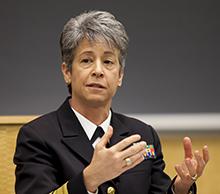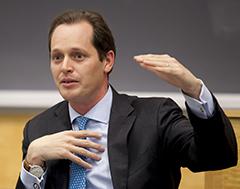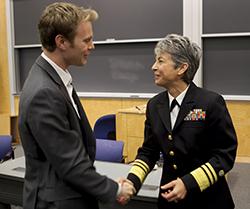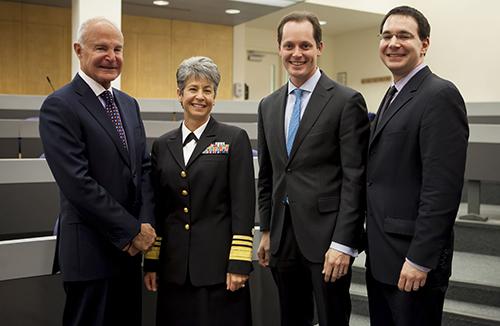Forging Careers in National Security Law
Vice Admiral Nanette DeRenzi, Judge Advocate General for the U.S. Navy, and Roger Zakheim, Former General Counsel of the House Armed Services Committee, Talk to Columbia Law School Students About Career Opportunities in National Security Law.
New York, November 12, 2014—National security law is a fascinating and intensely marketable field, said Vice Admiral Nanette DeRenzi, Judge Advocate General (JAG) of the U.S. Navy, and Roger Zakheim, former general counsel of the House Armed Services Committee, in a November 6 talk at Columbia Law School.
Professor Matthew C. Waxman, Liviu Librescu Professor of Law, and Mel M. Immergut ’71, a lecturer and adjunct senior research scholar for national security law, moderated the conversation.
| Vice Admiral Nanette DeRenzi, Judge Advocate General (JAG) of the U.S. Navy |
Waxman, co-chair of the Law School’s Roger Hertog Program on Law and National Security, said national security law is consistently rewarding because it is complex and ever-changing.
“When I started in this field everyone told me I should learn Russian; now they’re saying that again,” he joked. Waxman served in senior positions at the U.S. State Department, the Department of Defense, and the National Security Council before joining Columbia Law School.
DeRenzi, the first female JAG of the U.S. Navy, said national security law offers a breadth of experience that few fields do.
| Roger Zakheim, former general counsel of the House Armed Services Committee |
Zakheim, a former deputy assistant secretary of defense who is now of counsel at Covington & Burling, offered advice on how young lawyers can build careers in the field.
“Find mentors and people you admire,” he said. “Write on national security issues—it will help you get attention. Whether it’s Foreign Policy or Lawfare or other outlets, there are so many opportunities to get your ideas out there.”
| Students meet with the speakers after the talk on careers in national security law. |
Immergut, a former chairman of Milbank, Tweedy, Hadley & McCloy who helps lead the Hertog Program’s activities linking the private sector and national security, said that lawyers from the corporate world play an important role in national security law and policy.
“There are no business people in the Pentagon,” Immergut said, noting that as a private sector attorney he brought a different perspective to his extensive work with government, including the military and intelligence agencies. “Don’t think that you won’t have opportunities just because you are in the private sector.”
Vice Admiral DeRenzi urged young lawyers with an interest in national security to consider serving in the military.
“Military service gives you an experience that few people—and fewer and fewer people—have, at the intersection of law, policy, and politics,” DeRenzi said. “I’ve had a ball in what I’ve done for the past 27 years. Engaging personally to move forward things you believe in is the most professionally rewarding thing you can do.”
The conversation was sponsored by the Roger Hertog Program on Law and National Security.
| (l-r) Mel M. Immergut '71, Vice Admiral Nanette DeRenzi, Roger Zakheim, and Roger Hertog Program Co-chair Professor Matthew C. Waxman |



